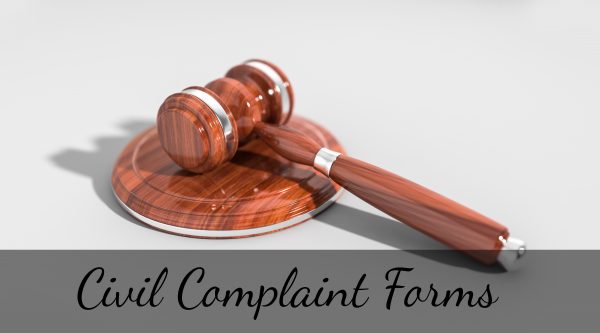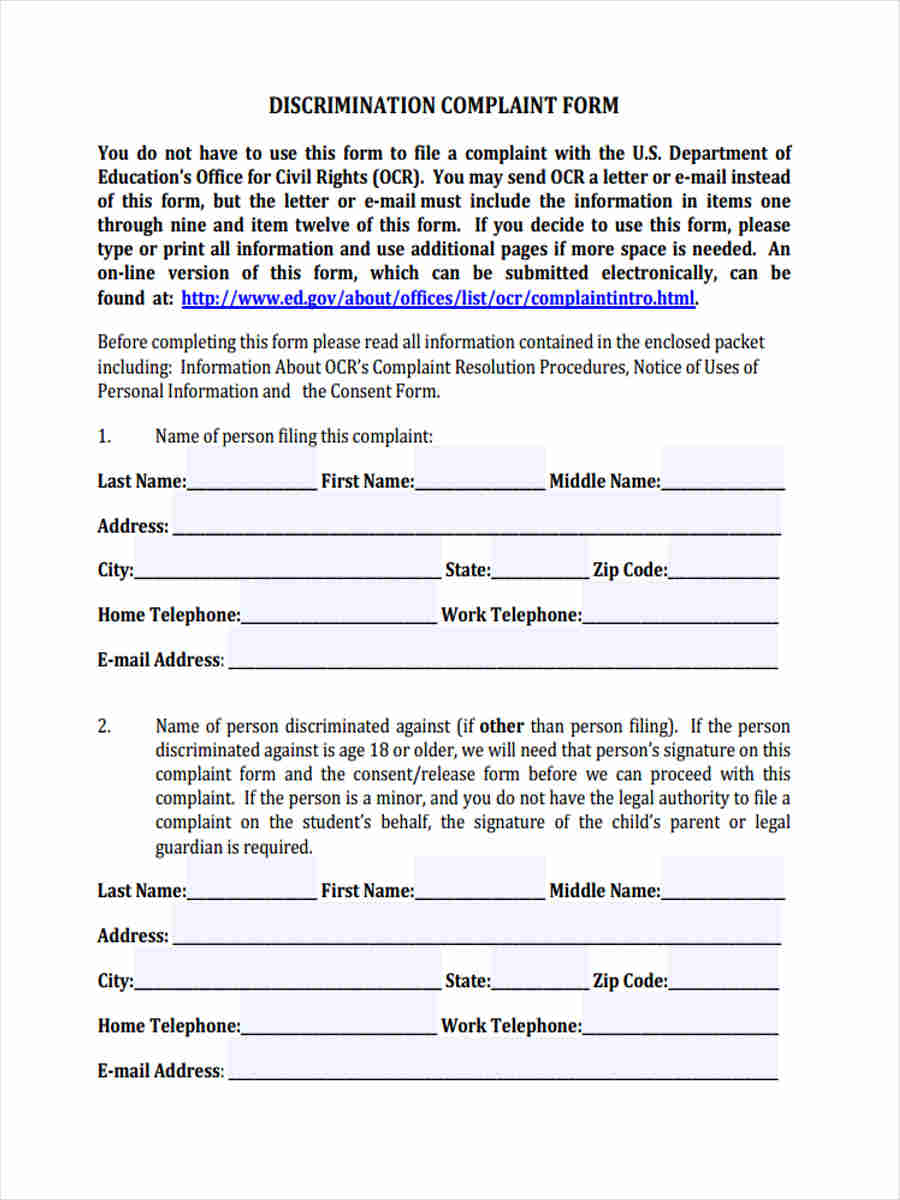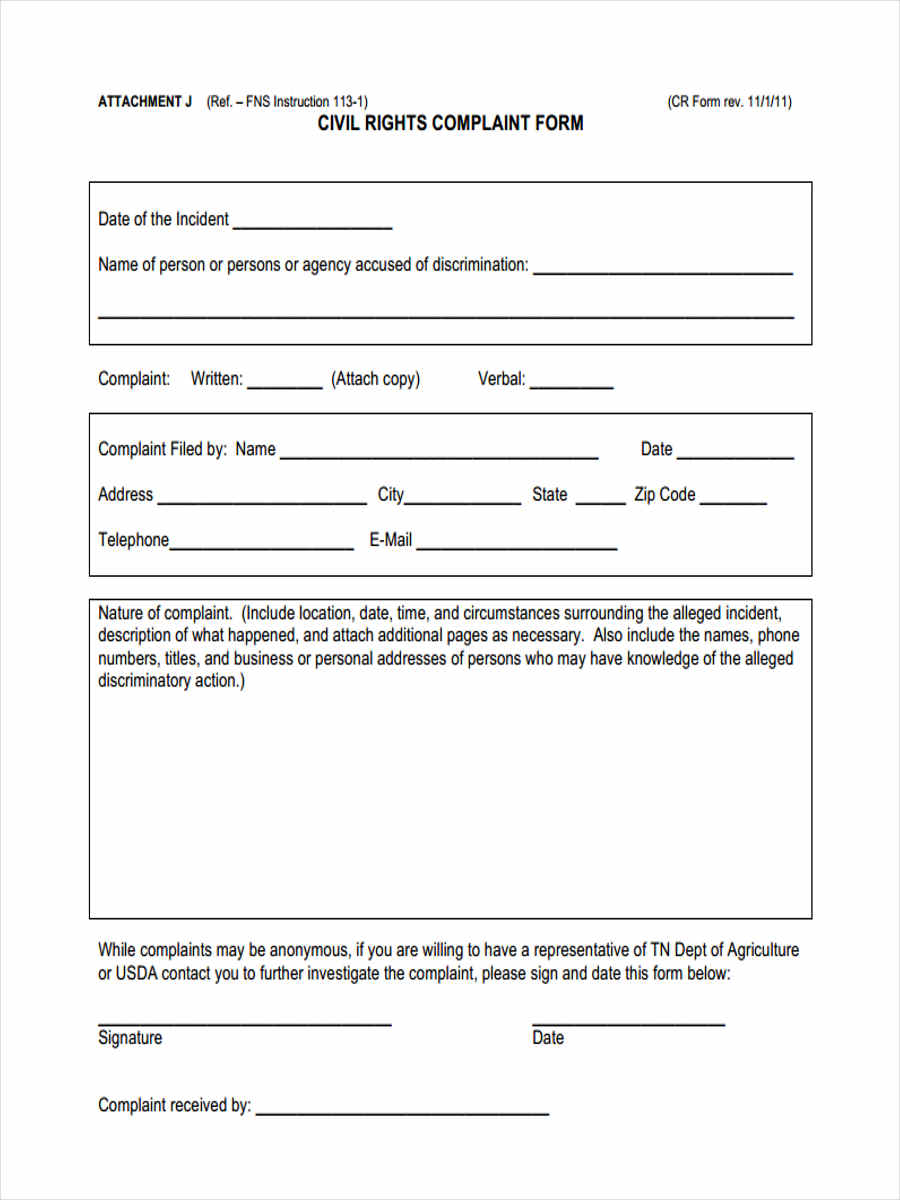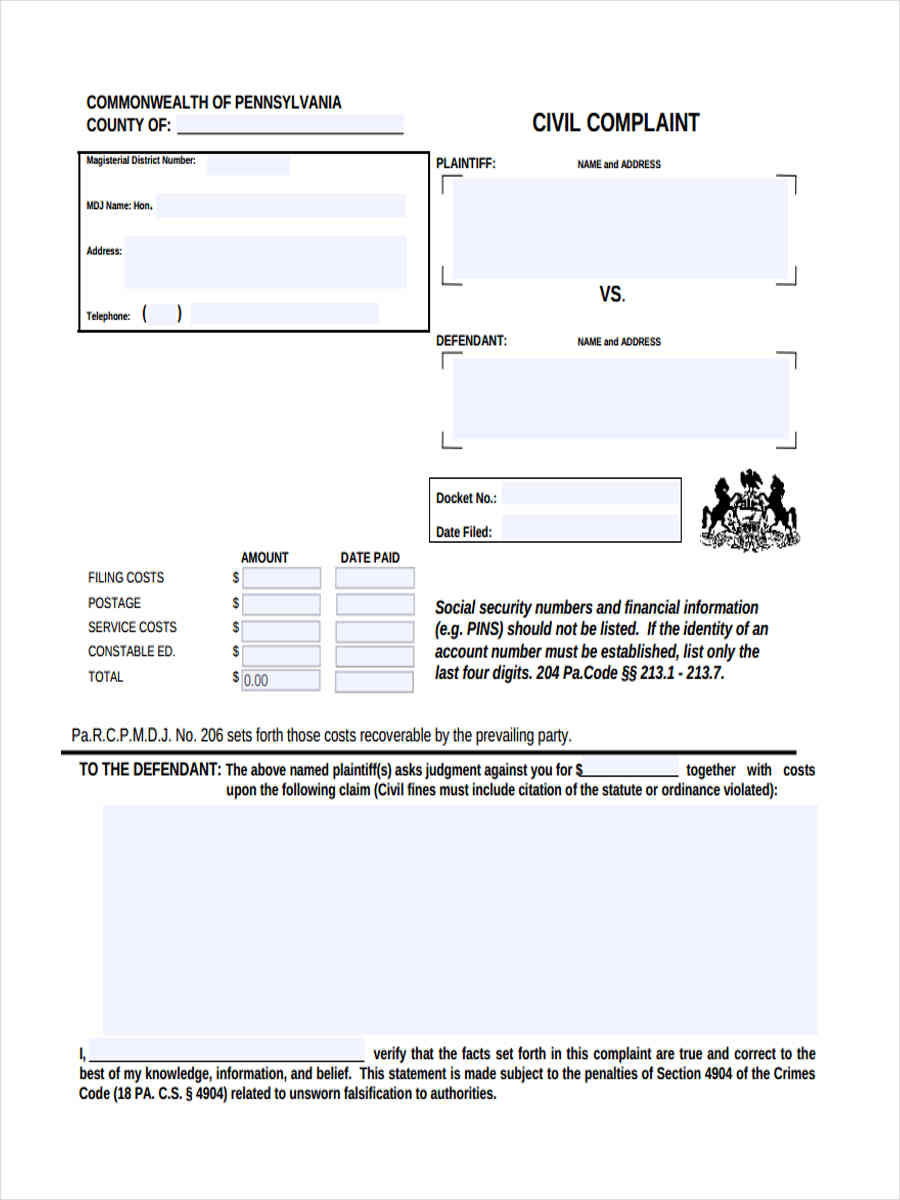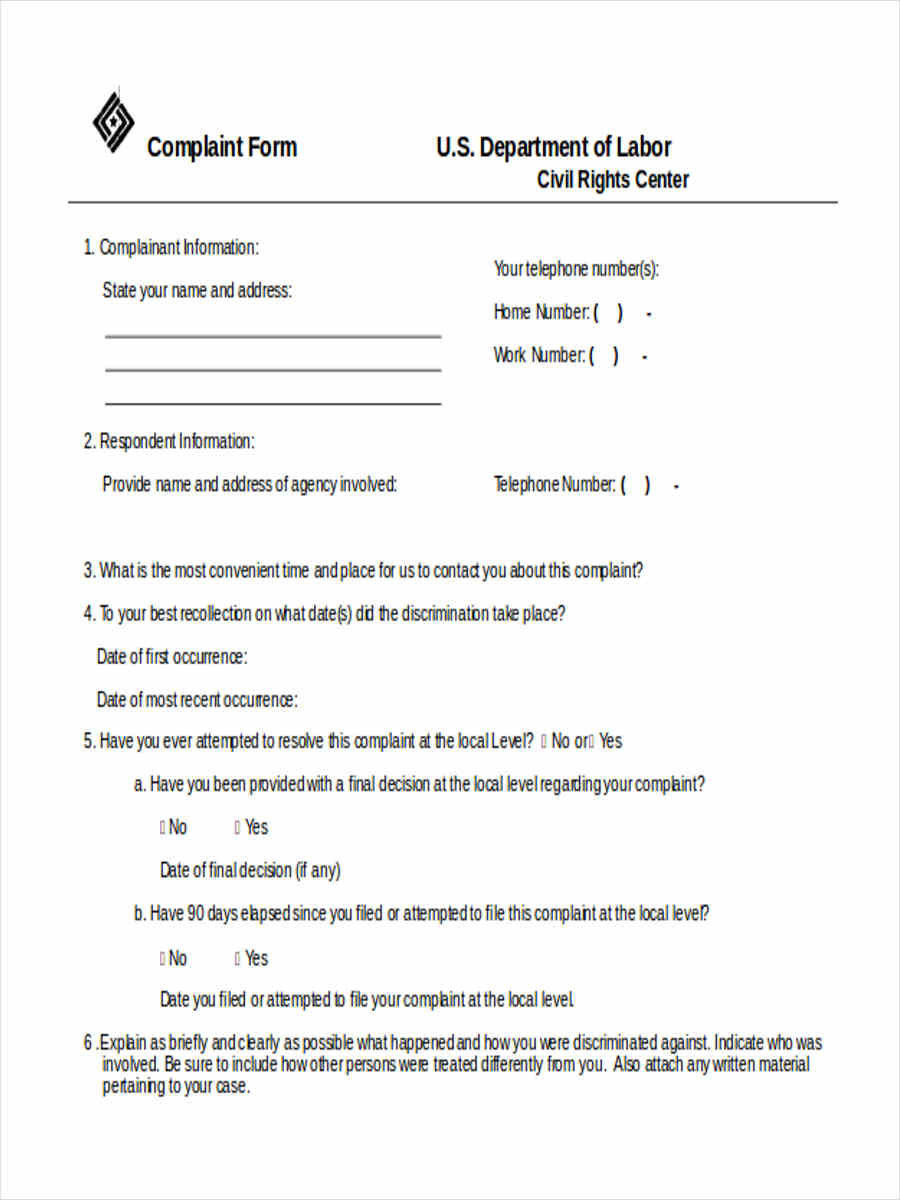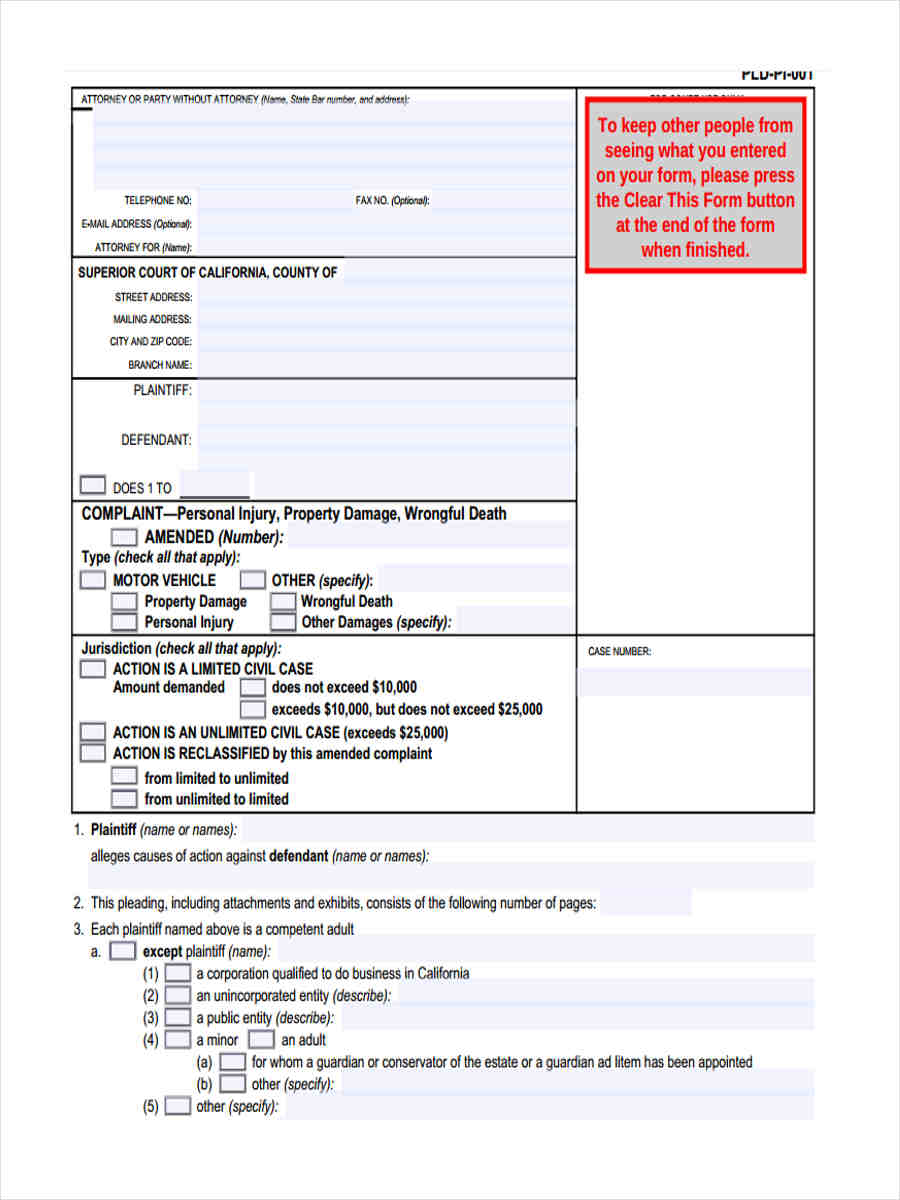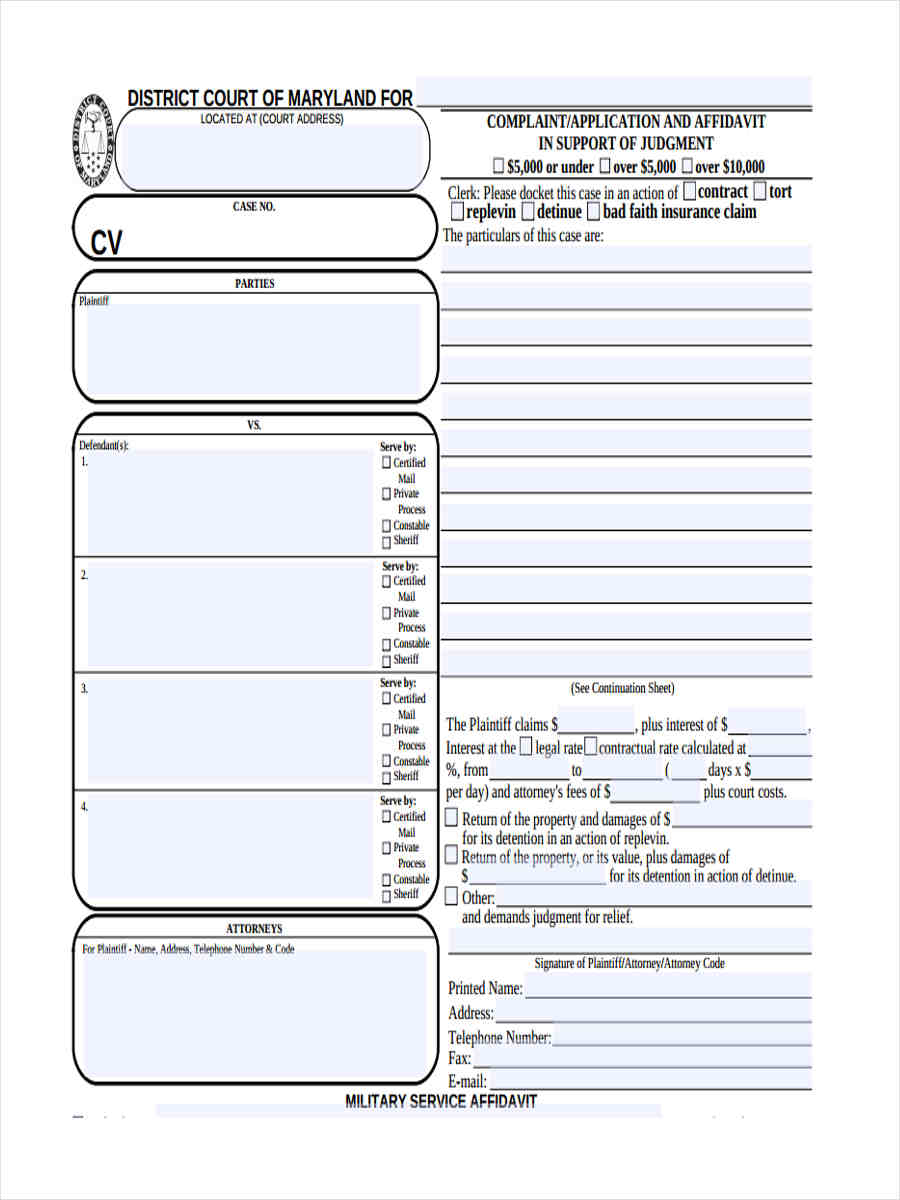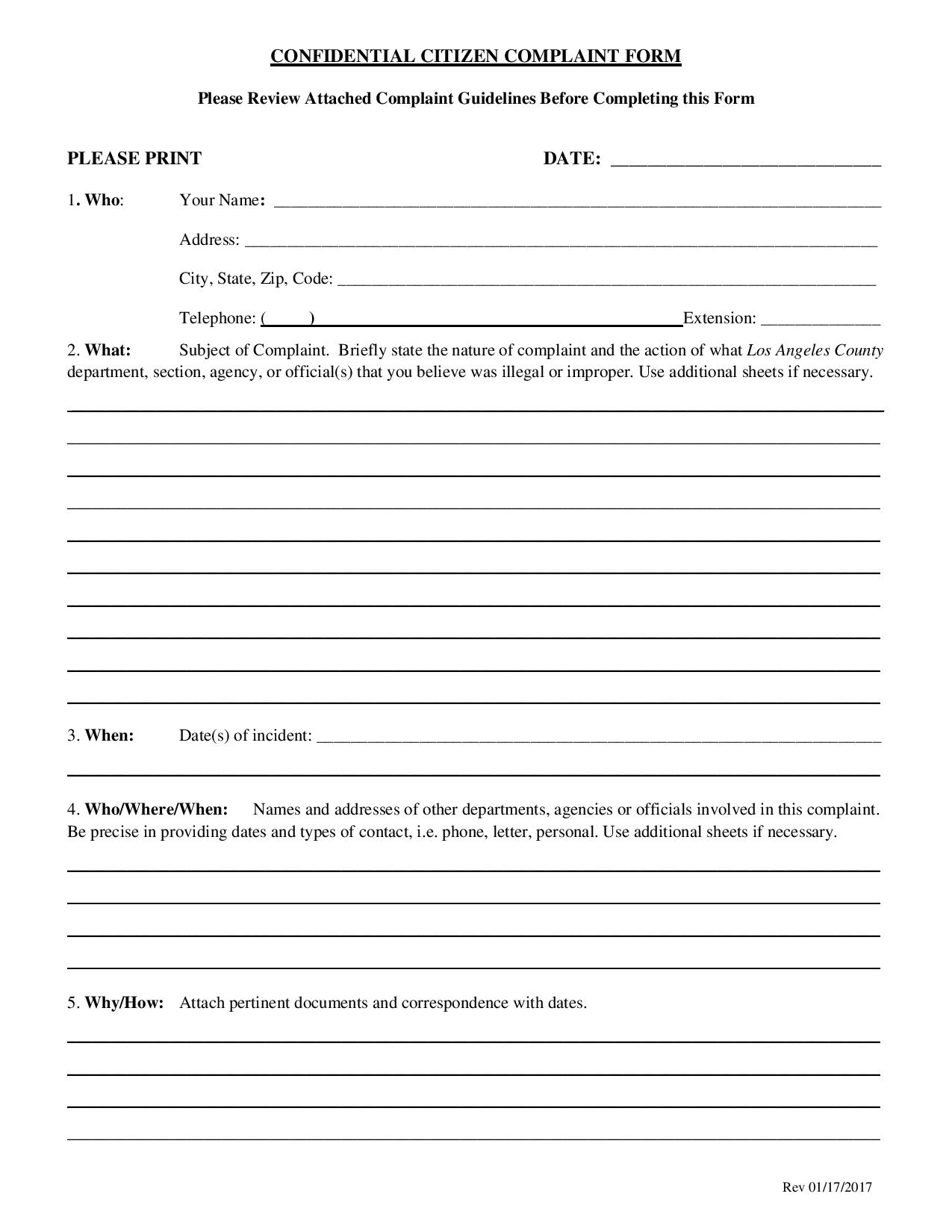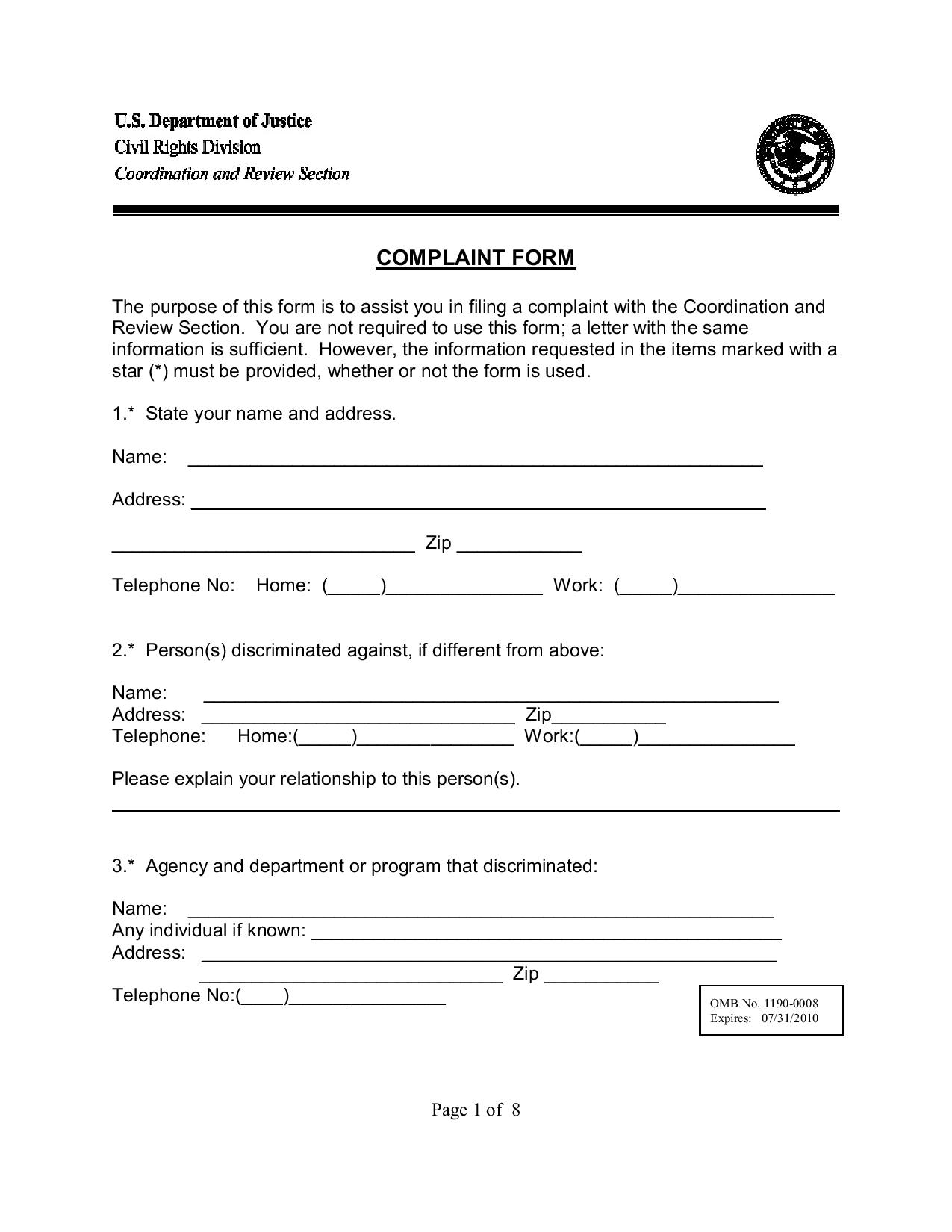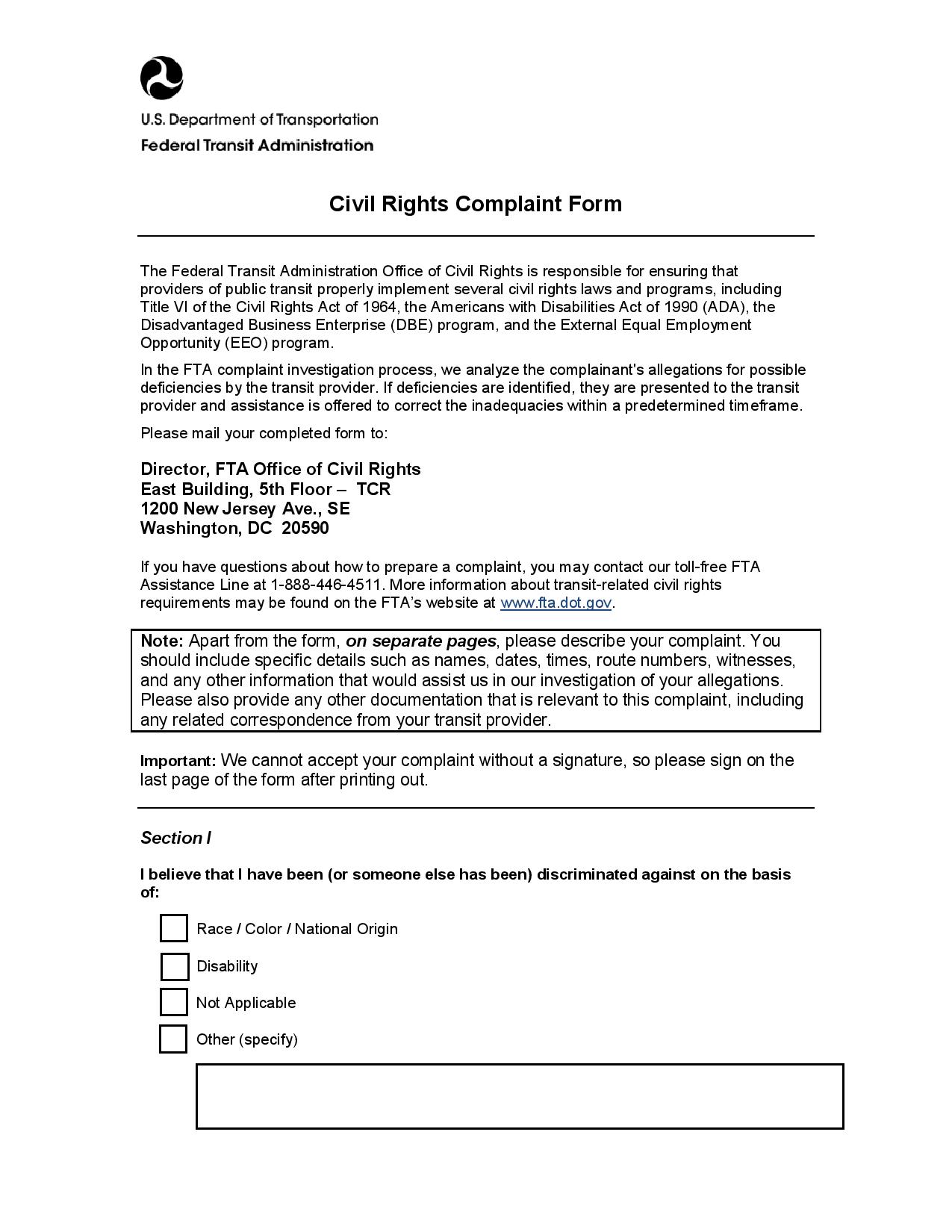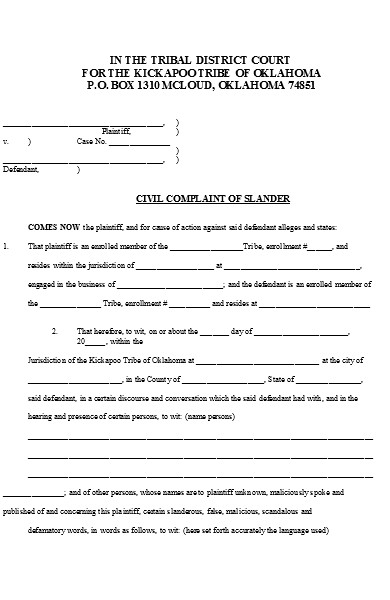People encounter problems on an almost daily basis. However, when they encounter one that hinders during meaningful experiences such as certain transactions or services that they have rendered, then often times they feel the need to voice out their concerns. With complaint forms, they’re able to point out what these problems are, as well as provide a solution as to how to solve them.
This is the reason why there are so many businesses that require their employees to learn how to deal with customer complaints so that certain issues are looked into and fixed as soon as possible. So, if ever you’re having a problem, remember to file a proper complaint which shows exactly what your problem is.
Federal Civil Complaint
Civil Rights Complaint
Civil Complaint Form
Civil Complaint Form Example
What Is a Civil Complaint?
A civil complaint is what initiates a civil lawsuit by setting forth some sort of claim for any unlawful conduct or property that’s damaged by the defendant. In simple terms, it’s a type of claim that one issues when another person has done him or her wrong. If you file a civil complaint against someone, then you’re stating that the accused has done something that goes against your civil rights. So you’ll need a good amount of information as well as evidence in the event that you wish to file any kind of civil complaint.
Common Types of Civil Cases
Lets say that you have filed a civil complaint against someone that has done you wrong. One thing you have to remember is that civil cases differ from criminal cases. A civil case is where one or both parties are seeking money or any other form of compensation, while criminal cases are mainly used to file some sort of criminal charge against another. Here are some examples of the most common type of civil cases that are brought up in court.
- Contract Disputes – A contract dispute is what happens when one or more parties who have signed a contract either cannot or will not fulfill his or her obligations. So lets say that you’ve hired a cleaning service to provide you with a service and that person has signed a contract agreement stating that work will be provided within a certain period of time. You were not able to acquire the service you needed so you then file a civil complaint. This is one of the most common type of cases that appear within the court of law.
- Property Disputes – This is the type of case that involves the dispute of one’s ownership regarding any kind of property or real estate. While there are many different types of property dispute that law attorneys may handle, the type of case depends on the kind of wrong that was done by one party against another’s property. So lets say that a tenant has signed a residential agreement form stating that he or she will not utilize the property for any illegal purposes. The tenant then breaks the agreement and has failed to respond to the property owner’s notice. The property owner may then file a civil complaint stating his or her case against the tenant, and explain the type of compensation that’s expected.
- Class Action Cases – This is when the prosecution of this type of case represents a group of people that have been hurt by the same thing. These are usually because of defective products or any sort of hazardous substance that these people were exposed to which eventually caused them harm. So, if these people were harmed and no action was taken to rectify the problem, they may file the complaint where it will be brought to court and have the allegations verified.
- Complaint Against the City – Cases such as this are usually settled outside of court, but there are some instances where the government refuses to settle these complaints. In the event that this happens, these complaints are then tried as civil cases. This type of case is brought up by a plaintiff claiming that the city law and/or policies have caused harm to its citizens. So if you and a couple of others have been been negatively affected by whatever law or policy the government has placed, you can file a civil complaint that can bring it up in the court of law in the hopes that it will be rectified.
- Torts – Its a case that’s very similar to class action cases. But instead of a group that has sustained injury, it’s an individual. Tort cases come in many different forms, and it usually involves one’s personal safety, financial security, or property safety. Common examples of tort cases are situations wherein one is a victim of assault or battery, or where one party has placed allegations that a caregiver was not able to do the duty that he or she was assigned to.
Civil Lawsuit Complaint Form
Free Civil Complaint
Confidential Citizen Complaint Form
How to File a Civil Complaint
Follow these steps in the event that anyone has done you any sort of wrong and has broken your civil rights:
- The first step would be to file the complaint with the use of the right type of complaint form. Although the court has some form of general complaint form that you can use, it doesn’t necessarily mean that you have to use it. You will then be provided with several instructions regarding how to file the complaint and information such as the paper size, the format of the document, the required signatures and the number of copies you must provide.
- The second step would be producing the summons. If you want the opposing party to know that you are filing a civil complaint, you must send that party a copy of whatever civil complaint you have. This service can be accomplished by issuing the summons through a clerk’s office. The court has a standard summon form that you can use to send out to the the party. So think of it as similar to a notice form where you’re making someone aware of a certain situation. You are required to complete at least two completed summons for each defendant that you have listed down in your civil complaint form. If you would like additional information, you can go through your country’s or state’s law regarding the filing of a civil complaint.
- Any kind of civil action you have will require you to include a completed civil covered sheet or a JS 44. This helps in assisting the clerk’s office in filing and processing your civil action. Just about every district course has a standard civil cover sheet that can be used along with a set of instructions on how it should be completed. If you need even further assistance on how to fill it out, you may visit the clerk’s office to help you complete it.
- Under federal law, you will be required to pay a filing fee of at least forty-thousand dollars or currency that’s equivalent to that when filing a civil action. You may pay via money order or the credit card method. In the event that you feel as if you are unable to pay the filing fee,you can complete an application to proceed in forma pauperis and submit that form along with your civil complaint. After which, a judge will then request to view your case to determine whether or not you may file your case without having the need to pay the full filing fee.
Department of Justice Complaint Civil Form
Civil Rights Complaint Form
Basic Civil Complaint Form
How to Handle Civil Complaints
Here are the things that you must do should you receive any kind of civil complaint:
- You’ll need to calculate the deadline of when you should respond. Usually you have at least twenty calendar days from when you’ve received the summons and complaint to file the response. If you do not respond by the end of the deadline, it will then result in a default judgement wherein the plaintiff gets everything that he or she asked for in the complaint. This means that you’re on the losing end and you wouldn’t want that to happen.
- Evaluate all of the available options. You can decide to resolve the issue with the plaintiff directly by negotiating the term or you can file an answer where you go against the plaintiff’s claims.
- You may also decide to sue the plaintiff if you have your own claims. This is what one calls a “counterclaim”, and it can fall under compulsory counterclaims if your claim arises out of the same underline’s as the plaintiff’s claims, or it could be a permissive counterclaim where it’s the exact opposite.
- When you decide to file a response rather than do nothing, you may then file it within your district court to ensure that they understand that you have formally sent out your response within the deadline.
- You will then have to expect what will happen next. Once you have filed your answer, the case process will move forward. You might be required to attend a hearing wherein the court will decide the action that should be taken. So, be very careful with your response, and make sure that you have taken care of all documentation and have filed everything that needs to be used should you respond to the plaintiff’s civil complaint.
Related Posts
-
Customer Complaint Form
-
5 Ways to Handle Customer Complaints in Food Industry
-
How to Stop Toxic Employee Complaints [ Reasons ]
-
Tips on Dealing With Harassment Complaints [ Types, Steps ]
-
Preventing Social Media Complaints [ Causes, Tips ]
-
8 Steps to Extinguish Customer Complaints
-
What if Managers Ignore Employee Complaints? [ Reasons ]
-
15 Ways to Handle Employee Complaints
-
5 Ways to Handle Customer Complaints
-
How to Handle Tenant Pet Complaints [ with Steps ]
-
How to Address an Employee Sexual Harassment Complaint [ Steps, Tips ]
-
5 Steps to Formally File a Harassment Complaint at Work
-
FREE 5+ Sample Eviction Complaint Forms in PDF
-
FREE 10+ Complaint Investigation Forms in PDF | Ms Word
-
FREE 6+ Maintenance Complaint Forms in PDF | Ms Word
